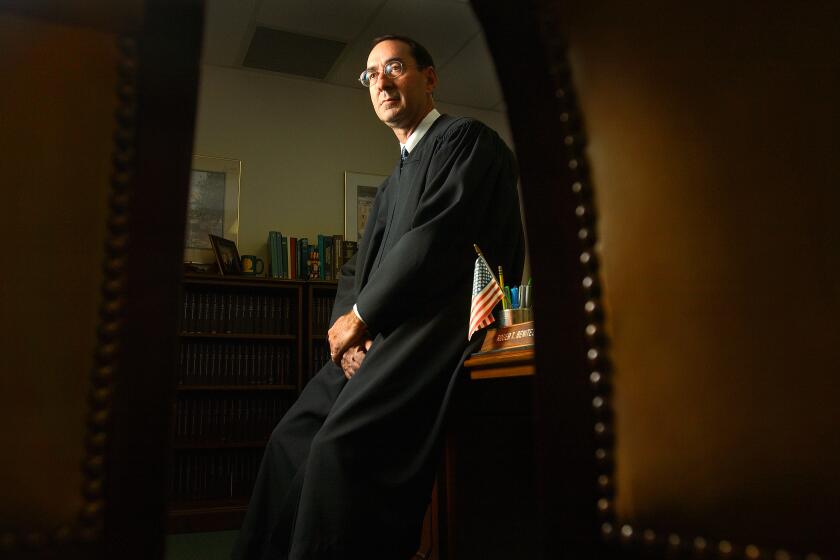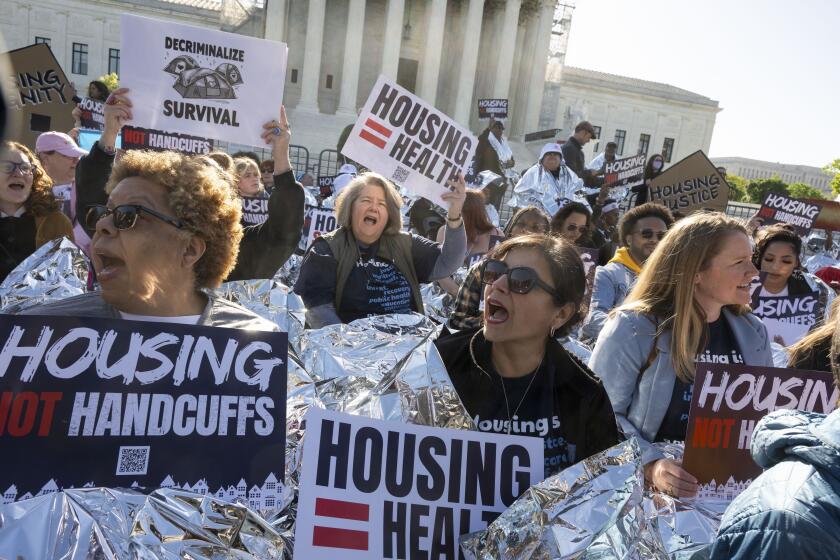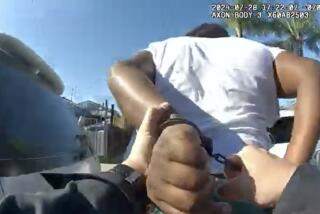People can’t be detained just for trying to avoid police, California Supreme Court says

- Share via
Police officers cannot detain someone on the street just because that person tries to avoid contact with them, the California Supreme Court ruled Thursday.
The decision has immediate implications for police officers working all across the state, restricting the grounds under which they can stop and hold people for questioning. It could also affect other litigation in which arrests are being challenged, particularly when people of color allege they were detained simply for trying to avoid police.
Someone acting nervous or attempting to conceal themselves can still be “relevant context” for officers, but those actions alone do not constitute “reasonable suspicion of criminal activity,” Justice Carol Corrigan wrote in the unanimous high court decision.
Officers “may consider what they see in plain view” and also can “approach people in public, engage them in consensual conversation, and take note of their appearance and behavior,” Corrigan wrote, but absent probable cause “the person is constitutionally protected and empowered to go on his or her way.”
U.S. District Judge Roger T. Benitez was reprimanded for judicial misconduct after he ordered the daughter of a criminal defendant handcuffed in court in what some witnesses described as a ‘scared straight’ tactic.
The decision — in a case brought by a Los Angeles man arrested on suspicion of having drugs and a gun after police said he tried to hide from them — was immediately blasted by the union that represents rank-and-file Los Angeles Police Department officers, which called the high court “out-of-touch.” The LAPD did not respond to a request for comment.
Richard Fitzer, an attorney for plaintiff Marlon Flores, praised public defenders who worked the case initially and called the ruling “a vindication of the rights of minorities.” The outcome was possible, he said, because of the Racial Justice Act, a 2020 California law that prohibits discrimination in the state’s criminal justice system based on a defendant’s race, ethnicity or national origin.
Justice Kelli Evans, the high court’s newest member, wrote in a concurring opinion joined by four other justices that said “many individuals — including, particularly, people of color — commonly hold a perception that engaging in any manner with police, including in seemingly casual or innocuous ways, entails a degree of risk to one’s safety.”
Evans listed the names of 35 people killed in interactions with police in recent years, including Michael Brown, Tamir Rice, Freddie Gray, Stephon Clark, Breonna Taylor and George Floyd.
“Due to this searing history and the present day experiences of far too many people in the United States, for generations, legions of parents in minority communities have given their children ‘the talk’ — detailing survival techniques for how to navigate interactions with police ‘all out of fear of how an officer with a gun will react to them,’” Evans wrote. “Given this context, it is apparent why attempting to avoid police officers reflects, for many people, simply a desire to avoid risking injury or death.”
In a case that could shape the future of psychedelic medicine, a palliative care physician is challenging a DEA decision that bars him from prescribing psilocybin to late-stage cancer patients.
The case began when Flores was arrested by LAPD officers in 2019. According to court records, he was standing on the street in what police described as a “known” drug area and “gang hangout” when he noticed the officers driving up, walked around a Nissan parked illegally and “ducked” behind it. The incident was captured on police body cameras.
The officers stopped, got out of their car and walked over to Flores, who was bent over and appeared to be moving his hands around his shoes. They told him to stand and put his hands behind his head, and handcuffed him within seconds.
According to the ruling, Officer Daniel Guy later testified that Flores “acted ‘suspicious(ly)’ by ‘attempting to conceal himself from the police’ and then ‘pretend(ing) to tie his shoe.‘”
As the officers patted down Flores, the lights on the Nissan blinked — which they assumed was because their frisk had pushed a key fob in Flores’ possession. An officer said that when he shined his light in the car he saw “what looked like a drug pipe.” The officers entered the vehicle and allegedly found a folded dollar bill containing methamphetamine and a revolver in a backpack.
After California’s governor and others called for the Supreme Court to take up the issue of homelessness, some now fear the outcome could amplify the proliferation of encampments in L.A. and other major cities.
In court, Flores attempted to suppress that evidence as improperly obtained, but his motion was denied by a lower court judge who, as Corrigan wrote, “reasoned that Flores’s acts of ‘ducking,’ ‘remaining hunched over,’ and ‘toying with his feet,’ even after the officers approached and told him to stand, was ‘odd behavior’ and ‘suspicious.’” The lower court said Flores had done “more than enough” to warrant his detention.
Flores was ordered to serve probation after pleading no contest to a single gun charge. He continued to fight the outcome, and the state Supreme Court took on his appeal.
Thursday’s decision sends the case back to the trial court so that Flores can withdraw his plea and the court can grant his motion to suppress the evidence against him. How his case might proceed from there is unclear.
In a statement to The Times, the Los Angeles Police Protective League defended its officers’ actions in the case, which it said took a gun in the hands of a criminal off L.A.’s streets.
“For most residents living in high crime neighborhoods that’s called good police work,” the union said. “Yet, in their infinite wisdom, California’s out-of-touch Supreme Court overturned two lower court rulings that found the officers acted lawfully and sided with the drug and gun possessing owner of the illegally parked car to further cement California’s criminal justice system as the joke it is.”
More to Read
Sign up for Essential California
The most important California stories and recommendations in your inbox every morning.
You may occasionally receive promotional content from the Los Angeles Times.














